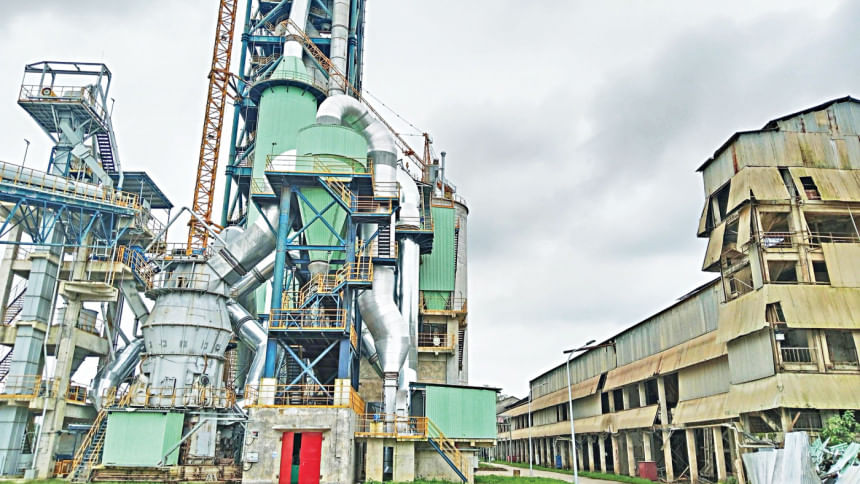Uncertainty lingers over Chhatak Cement’s return to operation

State-run Chhatak Cement Company in Sunamganj might not return to production anytime soon as its modernisation project is set to miss the deadline for the second time while uncertainty over the supply of the key raw material persists.
Initiated in 2016, the project aims to replace the existing wet process with the dry one and ensure a daily output of 1,500 tonnes in a fuel-efficient and eco-friendly way, up from 200-300 tonnes when it was last operational in March 2020.
The delay comes despite the construction of the factory, silos and other important components and largely because the supply of the key raw material – limestone – from India is yet to be finalised and the new ropeway has not been installed.
Even if the neighbouring country agrees to supply limestone, imports can't start immediately since the construction of the ropeway will take at least another two years.
"If the process of procuring limestone from India is not finalised soon, there is a possibility of a further delay in the production of cement from the plant," said the Implementation Monitoring and Evaluation Division (IMED) in a report on the modernisation of the country's first state-owned cement factory.
Due to a lack of approval for building the new ropeway on the Indian part, uncertainty has arisen in completing all of the tasks of the project, said the report, which was published in June.
Chhatak Cement Company was established in 1937 as a private company named Assam Bengal Cement Factory and was nationalised in 1966.
The Bangladesh Chemical Industries Corporation (BCIC) has been running the factory since 1982 and producing cement using the age-old wet process method.
Initially, the annual production capacity was 60,000 tonnes. In 1987, it was increased to 2.33 lakh tonnes. But due to the ageing machinery, it had dropped to 200-300 tonnes.
As a result, the state-owned cement manufacturer has become a loss-making company despite huge potential, said the IMED report.
In 2016, the BCIC took a Tk 667 crore project to modernise the manufacturing system in four years and set up a modern clinker factory.
However, the project could not be completed on time, prompting the government to revise the deadline to December 2023 and the cost to Tk 890 crore.
BCIC also brought changes to the initial plan. Instead of renovating the existing ropeway that fetches limestone from India, the state agency has decided to construct a new ropeway and added a 10-megawatt power plant instead of 6MW.
Besides, there was a need for an extension of the project as a lot of time had been wasted in processing tenders, including the appointment of consultants, according to a planning commission document.
Amid the sharp appreciation of the US dollar against the taka, BCIC has recently proposed the planning ministry extend the project's deadline to June 2025 and raising the budget to Tk 1,418 crore.
The work of the 17-kilometre ropeway from the factory to India has not begun as the permission to build its Indian portion is yet to be confirmed.
"We will start to build the ropeway on our part next month," said Abdur Rahman Badsha, project director, last week.
An official of the factory said that even after finalising the necessary permissions to construct the ropeway and import limestone, it would take at least two years to establish the ropeway.
Similarly, the installation of a dedicated gas line from Jalalabad Gas Transmission and Distribution System Ltd in Sylhet to the factory to meet energy demand has not been initiated yet.
The contract is yet to be inked and this will also take at least two years.
"As a result, the factory will not be operational within at least two years," the official said.
The IMED report said the progress on securing the raw material from India is only 10 percent.
However, Badsha is optimistic about resuming the process of getting raw materials from India.
"We have signed a contract with India. Under the deal, India will supply the raw material until 2033. But they are not supplying it."
He added: "We will start to build the ropeway on our part next month."
Limestone supply will also rely on the outcome of a legal battle being fought by limestone exporters of Meghalaya and the Indian state.
The High Court of Meghalaya imposed a ban on mining activities in the state following an application from the state's environment department.
Last year, the Supreme Court of India granted permission to exporters to export limestone to Bangladesh. The apex court also granted permission to the petitioner to file a special leave petition in connection with the case.
A hearing on the admissibility of the petition is pending before the apex court.
According to an audit report, Chhatak Cement incurred a loss of Tk 50.81 crore in the fiscal year of 2021-22. The company also suffered losses in the previous several years.
The IMED report recommended finding alternative sources for raw materials.
Khondaker Golam Moazzem, research director of the Centre for Policy Dialogue, says the project is in the middle of its implementation period and the government has already spent a huge amount of money.
"But the project shouldn't be uncertain due to a lack of supply of raw materials," he said, calling on the authorities to explore alternative sources for raw materials.



 For all latest news, follow The Daily Star's Google News channel.
For all latest news, follow The Daily Star's Google News channel. 



Comments